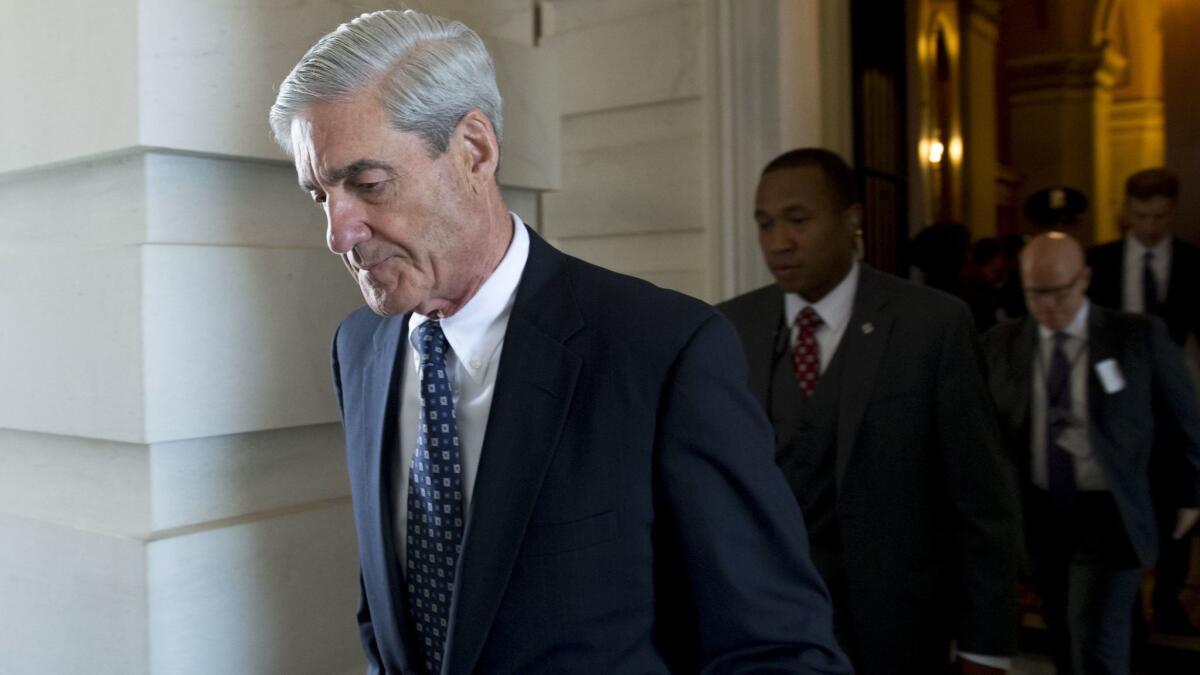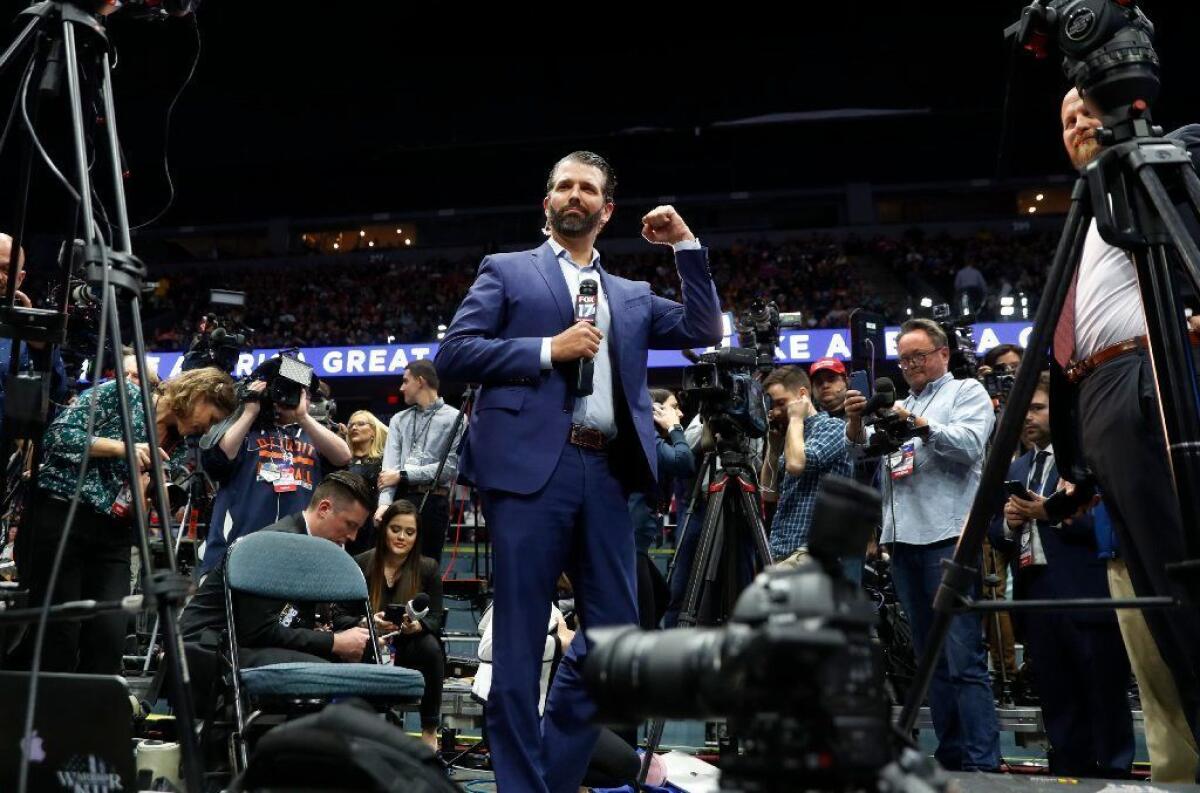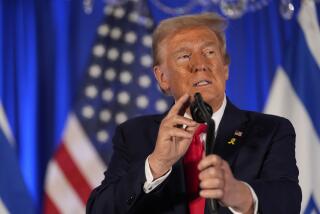Mueller couldn’t answer some crucial questions in Russia investigation

Reporting from Washington — Judging by the numbers, special counsel Robert S. Mueller III left no stone unturned in the Russia investigation. His office issued more than 2,800 subpoenas, carried out almost 500 search warrants and spoke with roughly 500 witnesses.
But as his 448-page redacted report makes clear, some answers — and some witnesses — remained outside his grasp. “The investigation did not always yield admissible information or testimony, or a complete picture of the activities undertaken by the subjects of the investigation,” Mueller wrote.
A mix of factors — including uncooperative witnesses and deleted text messages — left blind spots. Here are some of the gaps in the investigation.
The professor’s tip
George Papadopoulos was a young foreign policy advisor for Trump’s campaign when a Maltese professor with Russian connections told him in April 2016 that Moscow had “dirt” on Hillary Clinton in the form of thousands of emails. The tip came before WikiLeaks had released any emails hacked by Russian operatives.
Papadopoulos shared the information with an Australian diplomat, who told the FBI, and the Greek foreign minister at the time. Mueller’s team wanted to know if Papadopoulos also informed the Trump campaign.
The report said Papadopoulos, who ultimately pleaded guilty to lying to investigators, sometimes “wavered” in his recollections. “Campaign officials … [have] stated, with varying degrees of uncertainty, that he did not tell them,” it added. “No documentary evidence, and nothing in the email accounts or other communications facilities reviewed by the Office, shows that Papadopoulos shared this information with the campaign.”
Another unexplained episode involved Papadopoulos’ communications with Sergei Millian, a businessman from Belarus, a former Soviet republic. Millian is a naturalized U.S. citizen but he “remained out of the country since the inception of our investigation and declined to meet with members of the Office despite our repeated efforts to obtain an interview.”
Deleted messages
Mueller obtained more than 230 orders for communication records, but he was unable to recover some messages. Richard Gates, Trump’s deputy campaign chairman, used WhatsApp encryption to share campaign polling data with a Ukrainian business associate who allegedly had Russian intelligence connections. To cover his tracks further, Gates regularly deleted the messages.
Investigators faced similar challenges when reviewing a mysterious meeting in the Seychelles, an archipelago in the Indian Ocean, involving Erik Prince, an informal Trump advisor, and Kirill Dmitriev, leader of a Russian sovereign wealth fund, in January 2017. Prince later discussed the meeting with Stephen K. Bannon, who helped steer Trump’s campaign before he became a White House senior advisor. Prince and Bannon shared dozens of text messages, the report said.
But Bannon often used his personal Blackberry and email for his job and “took no steps to preserve these work communications,” the report said. And Prince’s phone retained no text messages before March 2017. Prince “denied deleting any messages but claimed he did not know why there were no messages on his device,” the report said.

No presidential interview
Trump initially said he would be happy to testify under oath, but he ultimately refused to meet with prosecutors. His lawyers said the president would only answer written questions about events during the campaign, not after he took office.
After Trump submitted his responses, the special counsel’s office complained to the president’s legal team that many were “incomplete or imprecise.” Even though he had publicly bragged about his memory, Trump claimed more than 30 times to not remember details. The answers “demonstrate the inadequacy of the written format, as we have had no opportunity to ask follow-up questions that would ensure complete answers and potentially refresh your client’s recollection or clarify the extent or nature of his lack of recollection,” the prosecutors wrote. But Mueller ultimately did not issue a subpoena to compel his testimony.
Like father, like son
Donald Trump Jr., the president’s eldest son, was involved in two episodes that came under scrutiny. He exchanged messages with WikiLeaks, the organization that released hacked Democratic Party emails. And he accepted a meeting at Trump Tower with a Russian lawyer after being told she had incriminating information on Clinton. But Trump Jr. “declined to be voluntarily interviewed,” Mueller wrote.
The special counsel’s office considered pressing charges against Trump Jr. because accepting Russia’s help on Clinton could be considered a “thing of value” and thus a violation of campaign finance laws. But prosecutors decided the evidence wasn’t there to make a case.
The Moscow trip
Carter Page, an energy consultant who served for several months as a foreign policy advisor to Trump’s campaign, traveled to Moscow to speak at the New Economic School in July 2016, and he met with Russian energy and government officials.
Prosecutors were unable to get a complete picture of his trip. “Page’s activities in Russia … were not fully explained,” the report said.
Kushner’s meeting
Sometimes prosecutors struggled to reconcile two divergent accounts of the same episode. For example, after the election Jared Kushner, Trump’s son-in-law and advisor, met with Sergey N. Gorkov, leader of a Russian government-owned bank. Kushner told the special counsel’s office that the meeting involved diplomatic issues, but the bank issued a public statement that it was considering doing business with the Kushner family’s real estate company. “The investigation did not resolve the apparent conflict,” the report said.
More to Read
Get the L.A. Times Politics newsletter
Deeply reported insights into legislation, politics and policy from Sacramento, Washington and beyond. In your inbox three times per week.
You may occasionally receive promotional content from the Los Angeles Times.











